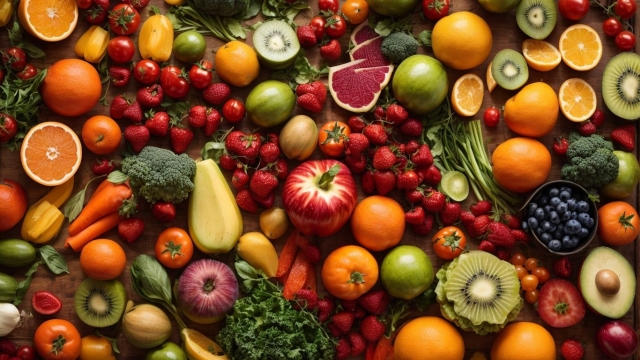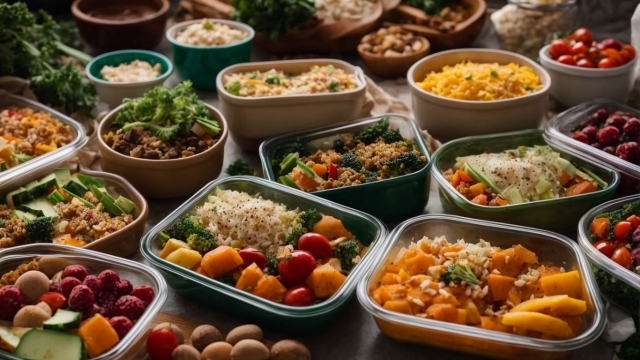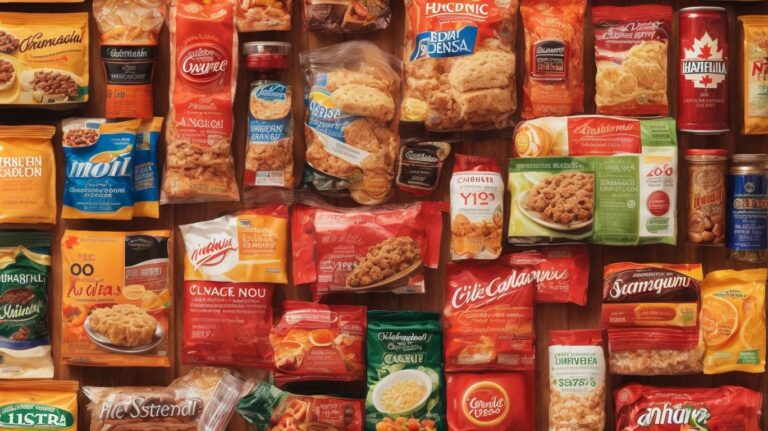Seasonal Foods: Buying and Cooking in Bulk
.jpg)
Seasonal foods not only provide nutritional benefits but can also be cost-effective when bought and cooked in bulk. This approach offers several advantages for individuals and families looking to save money, reduce food waste, and save time in the kitchen. According to a study published in the Journal of Nutrition Education and Behavior, buying and cooking in bulk can lead to significant cost savings and reduced food waste.
By buying and cooking in bulk:
-Saves Money: Purchasing seasonal foods in bulk often comes at a lower price per unit, resulting in cost savings over time.
-Reduces Food Waste: Buying in bulk allows you to only purchase the necessary quantity, reducing the chances of food spoilage and waste.
-Convenience and Time-saving: Cooking in bulk enables you to prepare meals in advance, which cuts down the time spent in the kitchen throughout the week.
When buying seasonal foods in bulk, it’s important to:
-Research the Seasonal Produce: Understand which foods are in season and readily available to make informed buying decisions.
-Find Local Farmers or Farmers Markets: Local sources often offer fresher and more affordable produce.
-Check for Quality and Freshness: Inspect the quality and freshness of the produce before making a bulk purchase.
-Consider Storage Options: Ensure you have suitable storage containers or freezer space to properly store the bulk purchased foods.
When cooking seasonal foods in bulk, consider:
-Meal Planning and Batch Cooking: Plan meals for the week and cook larger quantities to have ready-made meals or ingredients.
-Preserving Techniques: Explore preserving techniques like canning, pickling, or making sauces and jams to extend the shelf life of seasonal produce.
-Proper Storage and Freezing: Ensure proper storage methods to maintain the freshness and quality of bulk-cooked foods.
There are various recipes and ideas to creatively utilize seasonal foods in bulk, such as making soups, stews, salads, or freezing fruits for smoothies.
By implementing these strategies, individuals can enjoy the benefits of seasonal foods while simultaneously saving money, reducing waste, and simplifying meal preparation.
Key takeaway:
- Saves money: Buying and cooking seasonal foods in bulk provides cost savings as it allows you to take advantage of lower prices and discounts offered when purchasing in larger quantities.
- Reduces food waste: By buying in bulk, you can minimize food waste as you can plan and use the ingredients efficiently, ensuring nothing goes to waste.
- Convenience and time-saving: Purchasing and cooking in bulk saves time and effort as you can prepare meals in advance and store them for later use, making it convenient for busy schedules.
Benefits of Buying and Cooking in Bulk
Looking to save money, reduce food waste, and save time in the kitchen? Discover the benefits of buying and cooking in bulk. Learn how purchasing seasonal foods in large quantities can lead to significant cost savings and contribute to a more sustainable approach to food consumption. Find out how this convenient practice can help streamline your cooking process, allowing you to enjoy delicious meals without spending excessive time in the kitchen. Get ready to explore the advantages of bulk buying and cooking in this enticing section.
Saves Money
Buying and cooking seasonal foods in bulk can save you money in various ways.
- Reduced cost per unit: Purchasing seasonal foods in bulk often results in a lower cost per unit compared to buying individual servings.
- Lower grocery bills: By buying in bulk, you can reduce the frequency of your grocery shopping trips, leading to lower overall expenses.
- Reduced food waste: With bulk buying, you can portion and freeze excess produce, reducing the chances of food spoilage and waste.
- Meal planning: When you have a surplus of seasonal foods, you can plan meals in advance, avoiding unnecessary trips to restaurants or ordering takeout.
- Preserving techniques: Bulk buying allows for the use of preserving techniques such as canning or freezing, extending the shelf life of seasonal foods.
Historically, buying and cooking in bulk has been practiced by various civilizations. For example, ancient Romans would store surplus foods for future use, ensuring their households were well-supplied throughout the year.
Reduces Food Waste
Reducing food waste is crucial for both the environment and our wallets. Buying and cooking in bulk is an effective way to minimize food waste and reduce food waste. Here are some tips to help you utilize all the ingredients efficiently and reduce food waste when buying and cooking seasonal foods in bulk:
| Proper meal planning and batch cooking | can help you utilize all the ingredients efficiently and reduce food waste. |
| Preserving techniques | like canning, pickling, or freezing can extend the shelf life of seasonal produce and reduce food waste. |
| Ensure proper storage and freezing methods | to maintain the quality and freshness of bulk purchases and reduce food waste. |
By following these tips, you can make the most of seasonal foods, reduce food waste, and save money in the process.
Convenience and Time-saving
Convenience and Time-Saving:
Convenience and time-saving are significant benefits of purchasing and cooking seasonal foods in bulk.
- Meal Planning: Save time during busy weekdays by planning your meals in advance and preparing larger quantities.
- Batch Cooking: Cook generous portions of dishes that can easily be reheated or repurposed for multiple meals.
- Preserving Techniques: Extend the shelf life of seasonal ingredients by using techniques such as canning, pickling, or freezing.
- Proper Storage: Ensure the freshness of bulk ingredients for longer periods by investing in storage containers and vacuum-sealed bags.
Incorporating these strategies into your cooking routine can save you time and effort while enjoying the convenience of having ready-to-eat meals or ingredients on hand whenever you need them.
Tips for Buying Seasonal Foods in Bulk
When it comes to buying seasonal foods in bulk, there are a few essential tips to keep in mind. We’ll uncover the secrets of researching the best seasonal produce and finding local farmers or farmers markets to support. We’ll also explore the importance of checking for quality and freshness, along with considering the various storage options available. With these insights, you’ll master the art of bulk buying seasonal foods, ensuring both freshness and savings in your kitchen!
Research the Seasonal Produce
Researching the seasonal produce before making bulk purchases is vital to ensure freshness, availability, and nutritional value. Below is a table that summarizes the advantages of researching the seasonal produce:
| Advantages of Researching Seasonal Produce |
|---|
| 1. Freshness: Researching the seasonal produce guarantees better taste and quality as it is harvested at its peak. |
| 2. Availability: By researching, you can determine which fruits and vegetables are currently in season and easily accessible. |
| 3. Nutritional Value: Seasonal produce is filled with essential vitamins, minerals, and antioxidants, offering optimal health benefits. |
True story: Sarah, a health-conscious individual, decided to research the seasonal produce to incorporate more of it into her diet. She discovered a multitude of fresh and affordable options available. Not only did this enhance the flavors of her meals, but it also contributed to her overall well-being. Sarah’s experience highlights the significance of researching seasonal produce for making informed and nutritious choices.
Find Local Farmers or Farmers Markets
Finding local farmers or farmers markets is a fantastic way to show support for local agriculture and gain access to fresh, seasonal produce. If you’re wondering how to find them, here are some helpful tips:
1. Conduct thorough research: Take advantage of online resources, community bulletin boards, and social media platforms to gather information about local farmers or markets in your area.
2. Explore local farms: Many farmers organize open-house days or offer farm tours. Seize the opportunity to personally meet the farmers and witness their farming practices firsthand.
3. Seek recommendations: Reach out to friends, neighbors, or coworkers who may already be purchasing from local farmers or visiting farmers markets. Their recommendations can be extremely valuable.
4. Check community listings: Make sure to visit your local library, community center, or town hall for any listings or directories that feature local farmers or farmers markets.
5. Attend community events: Stay alert for food festivals, agricultural fairs, or community events where local farmers or markets are likely to be present. These events serve as excellent platforms to connect with them and learn more about what they offer.
Check for Quality and Freshness
When buying seasonal foods in bulk, it is essential to check for quality and freshness to ensure you’re getting the best produce. Here are some tips to incorporate the keywords “Check for Quality and Freshness” naturally:
- Inspect the appearance of fruits and vegetables, carefully checking for any bruises, mold, or signs of spoilage to ensure their quality and freshness.
- Pay attention to the smell – fresh produce should have a pleasant aroma, indicating its quality and freshness.
- Check the texture – it should be firm, with no soft or mushy spots, ensuring its quality and freshness.
- Consider the color – vibrant and bright hues are typically indicators of freshness, allowing you to check for quality and freshness visually.
- Ask the vendor about the harvesting and storage methods used to maintain quality and ensure freshness.
By incorporating these steps to check for quality and freshness, you can make sure you’re getting the most flavorful and nutritious seasonal foods.
Consider Storage Options
When considering storage options for buying and cooking seasonal foods in bulk, it’s important to keep a few tips in mind:
- Assess your storage space: Before purchasing in bulk, take a moment to evaluate the space you have available for storage, whether it’s a pantry or freezer.
- Use airtight containers: It’s crucial to store foods in containers that are airtight to maintain their freshness and prevent any potential spoilage.
- Label and date: Make sure to properly label and date your bulk items. This will help you keep track of their freshness and avoid any confusion.
- Consider freezing: If you’re looking for longer-term storage options, freezing is an excellent choice. Opt for freezer-safe bags or containers and ensure you remove as much air as possible.
- Utilize canning or pickling: If you possess the necessary equipment and skills, think about canning or pickling seasonal produce. This can significantly extend their shelf life.
Tips for Cooking Seasonal Foods in Bulk
Cooking seasonal foods in bulk can be a game-changer in the kitchen. With this section, we’ll explore a few tips that will revolutionize the way you approach cooking in bulk. From meal planning and batch cooking to discovering effective preserving techniques, we’ll share insights on how to make the most of seasonal ingredients. Not only that, we’ll also dive into proper storage and freezing methods to ensure your favorite seasonal flavors can be enjoyed well beyond their peak. Get ready for a culinary adventure!
Meal Planning and Batch Cooking
Meal planning and batch cooking are effective strategies for maximizing efficiency in the kitchen. By engaging in thoughtful meal planning and batch cooking, individuals can save time and effort by preparing multiple meals in advance. This approach streamlines the cooking process and ensures that there is always a healthy and delicious meal readily available.
To make the most out of meal planning and batch cooking, consider the following tips:
- Plan your meals for the week: Dedicate some time to meticulously plan your meals ahead, taking into account your schedule and dietary preferences.
- Choose easily scalable recipes: Opt for recipes that can be effortlessly multiplied, such as casseroles, soups, and stews.
- Create a shopping list: Based on your well-thought-out meal plan, compile a comprehensive shopping list that includes all the necessary ingredients.
- Prep ingredients in bulk: Before embarking on the cooking process, save time by prepping ingredients in bulk, such as chopping vegetables, measuring ingredients, and marinating meat.
- Cook in larger quantities: Instead of making individual servings, prepare larger batches of each recipe and portion them into individual containers.
- Properly store your meals: Utilize airtight containers or freezer bags to maintain the freshness and quality of your meals in the refrigerator or freezer.
- Label and date your meals: To avoid any confusion, label each container with the name of the dish and the date it was prepared.
- Reheat and savor: When it’s time to eat, conveniently reheat your pre-prepared meals and savor a nutritious and delicious meal.
Preserving Techniques
Preserving Techniques
Preserving seasonal foods in bulk ensures their availability throughout the year and reduces waste. Here are some effective preserving techniques to prolong the shelf life of seasonal produce:
- Canning: We can preserve fruits, vegetables, and jams in glass jars by using the canning method, which involves heat sterilization.
- Freezing: To retain the nutrients, we should blanch vegetables and then freeze them in airtight bags or containers.
- Dehydrating: By removing moisture from fruits, vegetables, or herbs, we can make them shelf-stable through the dehydrating technique.
- Pickling: Immersing vegetables or fruits in a vinegar-based solution allows us to preserve them using the pickling method.
- Fermenting: To naturally preserve foods, we can use salt or brine and cultivate good bacteria that convert sugars into lactic acid through the fermenting process.
By employing these preserving techniques, you can enjoy the flavors of seasonal produce all year round. Experimenting with different preservation methods can also elevate your culinary skills and enhance the diversity of your meals.
Proper Storage and Freezing
When it comes to buying and cooking seasonal foods in bulk, proper storage and freezing are crucial. Here are some helpful tips to ensure the freshness and longevity of your ingredients:
- Label and date your stored foods to easily keep track of their freshness.
- Invest in airtight containers or freezer bags to safeguard against freezer burn and maintain the quality of your ingredients.
- To preserve the texture and color of vegetables, consider blanching them before freezing.
- Maximize space in your freezer and make it easier to locate items by organizing it effectively.
- To avoid bacterial growth, make sure to thaw frozen foods properly in the refrigerator.
Recipes and Ideas for Cooking Seasonal Foods in Bulk
When cooking seasonal foods in bulk, there are plenty of recipes and ideas for cooking seasonal foods in bulk to consider. Here’s a table that showcases a few options:
| Recipe | Ingredient | Quantity |
|---|---|---|
| Vegetable Soup | Carrots, Potatoes | 10 lbs |
| Tomato Sauce | Tomatoes | 15 lbs |
| Berry Jam | Strawberries, Sugar | 20 lbs |
| Pickled Vegetables | Cucumbers, Radishes | 12 lbs |
| Apple Pie Filling | Apples, Cinnamon | 8 lbs |
These recipes and ideas for cooking seasonal foods in bulk can help you save time and money, while also enjoying the delicious flavors of fresh and seasonal ingredients.
Some Facts About “Seasonal Foods: Buying and Cooking in Bulk”:
- ✅ Buying seasonal foods in bulk can help you take advantage of wholesale produce prices and save money. (Source: chefstore.com)
- ✅ Preserving bulk produce and meats through canning extends the shelf life of your groceries and allows you to enjoy them for longer. (Source: chefstore.com)
- ✅ Canning fall foods like fruits, pickles, and chutneys can be done through water bath canning for high-acid foods and pressure canning for low-acid foods. (Source: chefstore.com)
- ✅ Pickling is a great way to extend the longevity of bulk produce, and you can use pickled vegetables and fruits in various dishes. (Source: chefstore.com)
- ✅ Dehydrating fruits, vegetables, and meats can help stretch your grocery budget and allow you to make delicious treats like fruit chips and beef jerky. (Source: foodal.com)
Frequently Asked Questions
Can I find new superior seasoning blends at bulk food stores?
Yes, bulk food stores offer a wide variety of superior seasoning blends. These blends are crafted to enhance the flavors of your meals and add a unique twist to your dishes.
How can I take advantage of wholesale produce prices during the fall season?
By buying in bulk, you can make the most of wholesale produce prices during the fall season. This allows you to save money and preserve extra ingredients for future use, whether for cooking or as holiday gifts.
What are the different canning methods for preserving fall foods?
There are two primary canning methods. Water bath canning is suitable for high-acid foods like fruits, pickles, and chutneys, while pressure canning is ideal for low-acid foods such as whole vegetables and meats. These methods ensure your preserved foods stay safe and flavorsome.
How can I stretch my grocery budget by cooking in bulk?
Cooking in bulk, or batch cooking, is an excellent way to stretch your grocery budget. By making large batches of ingredients that can be used to create various meals throughout the week, you can save both time and money.
Can I save time by cooking in bulk?
Yes, cooking in bulk saves time. By dedicating an hour or two one night a week to prep and cook large batches of ingredients, you significantly reduce the amount of time spent cooking throughout the week. This method allows for efficient cooking and meal preparation.
How can I make meal planning easier when cooking in bulk?
Cooking in bulk allows for easier meal planning. By portioning out meals in advance, you can simply grab a pre-prepared container from the fridge when you’re ready to eat. This eliminates the need to spend time cooking every meal and helps you stay on track with your eating habits.
- How to Reduce Food Waste and Save Money - October 28, 2023
- Frugal Snack Ideas for Kids - October 27, 2023
- Top 10 Frugal Meal Ideas for Large Families - October 27, 2023





